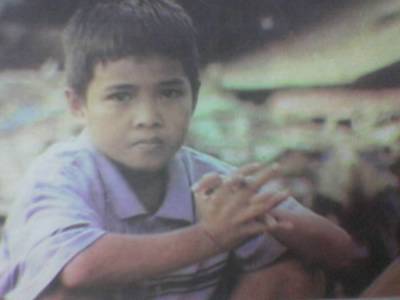Sunday Inquirer Magazine: The Little Hero
Enteng has always been an asset to Stimson and Rosalinda . Being the eldest boy in the family, he is tasked to take care of his siblings, a responsibility he has neither resented nor tried to escape. Enteng takes care of 5 children, whose ages range from six to one, while his mother volunteers at the nearby day-care center to augment the family income. “Mahal na mahal ko po sila (I love them very much),” Enteng says of his brood. Even at play, Enteng is often seen carrying 1-year-old Junior.
His parents had always known that their firstborn was different from other kids. At an early age, Enteng showed a certain earnestness and maturity beyond his years. Although outgoing when with his dumpsite playmates, his father sensed a pensiveness in him. “Minsan tahimik lang yan, sa isang tabi (He’s a quiet child. Oftentimes he just stays in a corner),” says Stimson, “Pinipili niya yung mga kalaro niya. (He chooses his playmates)”
Photo by CBN Cameraman Manny Pelayo
“Noong linggo po, bago mangyari ang trahedya, naglalaro po kami ng taguan. Masaya po kami noong naglalaro kami. Hindi ho namin naisip na mangyayari po ang trahedya, (A day before the tragedy, my playmates and I were playing hide and seek. We were happy. It didn’t cross our minds that this tragedy would happen)” Enteng says, with his head bowed down. Yet, his father said they were not really caught by surprised. Last August 1999, a tragedy of a smaller scale had already transpired at Lupang Pangako. Nobody was seriously hurt that time. so for many, this did not serve as a warning for many of the residents living in the dump. Perhaps it did, but Rosalinda said they didn’t have much choice. Their economic status could not afford them the right to move to safer ground. “I-rerelocate ho dapat kami. Pero dito rin, malayu-layo lang sa basura (They tried to relocate us, but it’s the same place a little far from the garbage) ,” explains Rosalinda, “Pinagbabayad kami ng P2,000 sa lugar, lugar lang. Wala pang bahay yun. Eh, wala naman po kaming ganun kalaking halaga. (They were asking us to pay them P2,000 just for the lot. That doesn’t even include the house. We didn’t have enough money.)”
Early dawn on the day of the tragedy, a neighbor warned Stimson that the heavy rains had caused water to rise to a dangerous level. This prompted him to wake his family. Stimson asked his eldest son to gather their things so that they could temporarily stay in a friend’s house. He thought his family would be safe there. He was wrong. At eight o’clock in the morning, Stimson saw a crack on the ground. When he put down hiis belongings, he saw the pile collapse. He shouted for his family to run, but when he looked again, the heap was already bearing down on them.
Rosalinda said she heard a loud explosion, in that instant her whole body was flung meters away from the house. She landed on the kitchen of a neighbor and struggled to get out. The first thing that went through her mind was her children. She didn’t know that she was about to lose a daughter.
Enteng was sorting out their belongings when he heard the loud noise. His first instinct was to go up the stairs to fetch Junior. Moving with a youngster’s agility, he quickly found his brother, who was crying lungs out, obviously startled by the noise. As soon as Enteng grabbed the baby, everything went pitch black. “Biglang dumilim, may makapal na usok. At saka may naririnig akong humihingi ng saklolo. Kinabahan po ako (It suddenly got dark. I heard people asking for help. I got nervous) ,” Enteng narrates.
“Nung makita ko si Enteng namumutla (When I saw Enteng he was very pale),” his father narrates. Father and son found each other near the store where they get their daily supply of pan de sal. The whole family was safe, except for Mary Rose, who was still missing. That afternoon rescuers found her body near the creek alongside those of her playmates. “Naisip ko kung nasagip ko sana si Mary Rose buhay pa sana siya ngayon, (If I were only to save Mary Rose, she would still be alive today.)” says Enteng, trying very hard to muffle the sobs.
In the cloistered school room of Lupang Pangako Elementary School that they shared with 10 families, the Tagle’s tried to recover from the shock of losing a dearly loved daughter. They were quite lucky. Some residents had more dead to bury. In some families, the dead outnumbered the living. Ironically, the only thing the Tagle’s were able to salvage from the rubble was Mary Rose’s school bag. For food and everything else, they had to depend on hand-outs and donations that came from the steady stream of civic-oriented groups that trooped to Payatas.
Three days after the disaster, singer Gary Valenciano made a surprise visit in the evacuation center to extend comfort to the victims. When Gary heard how Enteng had risked his life to save his brother and playmate, he hugged the boy tightly and called him a hero.
But for someone like Enteng a title like that doesn’t mean much. What matters to him is that his playmates and siblings, the people closest to his heart, would live to enjoy another day of play. “Basta lumakas lang po ang loob ko. Naisip ko kailangan ko siyang sagipin Dahil kalaro ko po siya eh, ( I had this conviction that I have to save her, because she is my playmate),” he says of his rescue of Kikay. “Dahil kalaro ko po siya eh. (Because she’s my playmate)” That is reason enough for him to have risked his life. Yet there is this gnawing sense that he could have done more–for Mary Rose, for his other playmates. His face turns reflective again. The rawness of his grief resurfaces as he tells me of his message to other kids his age: “Mga bata mahalin nila yung mga kapatid ninyo, kasi baka matulad sila sa kapatid ko. (You should love your siblings. You never know, they might end up dead like my sister.)” Then he looks away. To distract him from the pain, I asked him what he wants to be when he grows up. “Gusto ko pong makatapos ng college, para maging pulis. Dahil po nagliligatas ng mga tao, (I want to finish college so that I can be a policeman. I want to save lives)” he intimates, “Masarap po ang pakiramdam kapag nagliligtas po ng tao eh. (Saving lives gives me a good feeling)”
Later, I learn from Rosalinda that this is to be Enteng’s last day at Lupang Pangako. The family is being relocated to the Erap Village in Montalban, Rizal, where a better life hopefully awaits them. As the sun sets, I accompany Enteng and his family as they leave this despicable place they have learned to love. This is a sacred moment in their lives. “Ayoko ko na ho tumira dito sa Payatas dahil baka gumuho uli, (I don’t want to live in Payatas anymore. We might experience a landslide again)” Enteng tells me. He leaves Lupang Pangako without even looking back, perhaps knowing he deserves so much more than this dump could ever offer.
–by Jennifer Y. Caspe
Published in the “Sunday Inquirer Magazine” August 27, 2000
Finalist for “Best Special Feature” at the 2001 Catholic Mass Media Awards




 Jenn C.
God-lover.
Milk & TV Producer.
Writer.
Entrepreneur. Natural Health Advocate.
Jenn C.
God-lover.
Milk & TV Producer.
Writer.
Entrepreneur. Natural Health Advocate.






your story brought me back to the tragedy that is Payatas…this things should not happen to our young. they should be somewhere safe from harm where they can grow and live their dreams…and not be part of a nightmare.